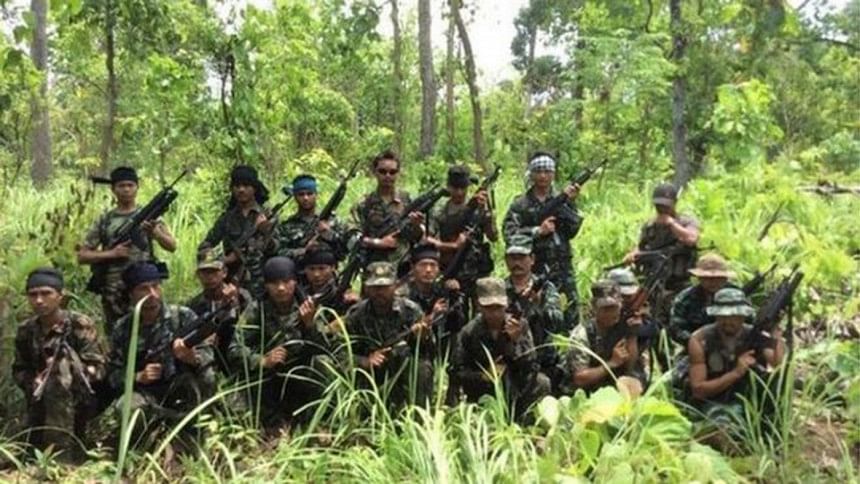Will peace deal with Naga rebels work?

On Monday India's government signed a "historic" peace deal with a leading Naga separatist group, bringing an end to one of the country's oldest insurgencies. Subir Bhaumik on whether the accord will bring peace to the country's restive north-east.
The rebels in north-eastern Nagaland state have been fighting for an independent homeland for two million Naga tribespeople for more than 60 years. The insurgency has been so far contained by a slew of ceasefires.
The chief of the main rebel group, National Socialist Council of Nagaland (NSCN), Thuingaleng Muivah has thanked Indian Prime Minister Narendra Modi for "understanding the problems faced by the Nagas" and signing the peace deal.
Modi has said the Naga problem festered so long because India and the Nagas failed to "understand each other".
The NSCN, formed in 1980, is now split in four factions - each with its own vision of a future Naga homeland.
Its leaders broke away from the Naga National Council (NNC) - that had led the armed separatist movement from 1956 - after the NNC signed an accord with India in 1975.
'Sell-out'
But Monday's agreement - the details of the deal have still not been revealed - has been signed with the dominant faction of the NSCN, and not with all the separatist factions.
Muivah's rival Naga leader SS Khaplang actually reneged on a ceasefire with India in March this year. His fighters have been attacking Indian security forces ever since.
At least 30 Indian soldiers have been killed in these attacks - at least 20 died in one strike in Manipur state in June.
Khaplang , who has an alliance with several other north-east Indian rebel groups, has already opposed the accord as a "sell-out" and said he will not compromise with the "Naga desire for independence".
"So it is certain that Khaplang's fighters will step up their attacks to torpedo the accord," says Naga journalist Bano Haralu.
"This is the risk the government has to take when it signed a deal with one rebel faction."
Haralu points to the success of the 1986 accord that brought an end to a similar insurgency in the north-eastern state of Mizoram.
"The 1986 accord signed by late prime minister Rajiv Gandhi's government was signed with the entire rebel leadership, not with a faction. That is why that accord has held," Haralu says.
India has signed accords with Nagas twice before - one in 1960 with moderate leaders who opposed the violent insurgency unleashed in 1956 by the NNC and the 1975 accord with NNC.
Naga aspirations
While the 16-point agreement between the government and the tribespeople in 1960 gave Nagaland a separate state carved out of the Naga hills district of neighbouring Assam, the 1975 Shillong accord was aimed at ending the insurgency by agreeing to work out a detailed settlement to fulfil the aspirations of the Nagas.
Interestingly, NNC hardliners led by Thuingaleng Muivah had opposed the 1975 Shillong Accord as a "sell out" and vowed to push ahead with their armed insurgency.
Exactly 40 years after he had fiercely opposed the 1975 Shillong Accord, Muivah has now signed an agreement that Modi claims will fulfil Naga aspirations.
Though the details of the Monday accord are not available, it is reliably learnt it will fall short of the NSCN's demand for a "Nagalim" (greater Naga state), created by integrating the Naga-dominated areas of the three states of Manipur, Assam and Arunachal Pradesh which border Nagaland.
The NSCN had insisted that it would give up the older separatist demand of independence only if India created this Greater Nagalim .
But Indian government interlocutor RN Ravi , who negotiated the Monday accord with the NSCN, is on record saying that this demand is "constitutionally feasible but politically difficult".
Manipur, Assam and Arunachal Pradesh states have opposed this demand that, if fufilled, would take away their Naga-dominated areas.
But the Monday accord promises far greater autonomy to these Naga areas than they now enjoy - and also some arrangement that ties them culturally to Nagaland.
Modi has already briefed leaders of opposition and regional parties whose support may be essential for a possible constitutional amendment to make the Naga accord work.
Whether they support Modi to help end India's oldest ethnic insurrection or not is an moot question. And the threat of violence by Naga rebel factions like the one led by Khaplang also looms large on the accord.
But Modi has made an attempt to settle India's oldest insurrection because he sees this as essential for the success of his 'Act East' foreign policy - one that seeks to use India's northeast as a gateway to South-East and East Asia to develop the backward region and help grow India's economy.
The story was originally published in BBC Online on 4th August, 2015.

 For all latest news, follow The Daily Star's Google News channel.
For all latest news, follow The Daily Star's Google News channel. 



Comments